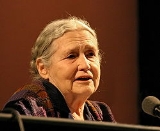
(née Tayler; born 22 October 1919) is a British
writer
. Her novels include The Grass is Singing
, The Golden Notebook
, and five novels collectively known as Canopus in Argos
.
Lessing was awarded the 2007 Nobel Prize in Literature
. She was described by the Swedish Academy
as "that epicist of the female experience, who with scepticism, fire and visionary power has subjected a divided civilisation to scrutiny". Lessing was the eleventh woman and the oldest ever person to receive the Nobel Prize in Literature.
In 2001, Lessing was awarded the David Cohen Prize
for a lifetime's achievement in British Literature
.
It is terrible to destroy a person's picture of himself in the interests of truth or some other abstraction.![]()
In university they don't tell you that the greater part of the law is learning to tolerate fools.![]()
If a fish is the movement of water embodied, given shape, then cat is a diagram and pattern of subtle air.![]()
That is what learning is. You suddenly understand something you've understood all your life, but in a new way.![]()
Literature is analysis after the event.![]()
Laughter is by definition healthy.![]()
Nonsense, it was all nonsense: this whole damned outfit, with its committees, its conferences, its eternal talk, talk, talk, was a great con trick; it was a mechanism to earn a few hundred men and women incredible sums of money.![]()
You know, whenever women make imaginary female kingdoms in literature, they are always very permissive, to use the jargon word, and easy and generous and self-indulgent, like the relationships between women when there are no men around. They make each other presents, and they have little feasts, and nobody punishes anyone else. This is the female way of going along when there are no men about or when men are not in the ascendant.![]()
It can be considered a rule that the probable duration of an Empire may be prognosticated by the degree to which its rulers believe in their own propaganda.![]()

